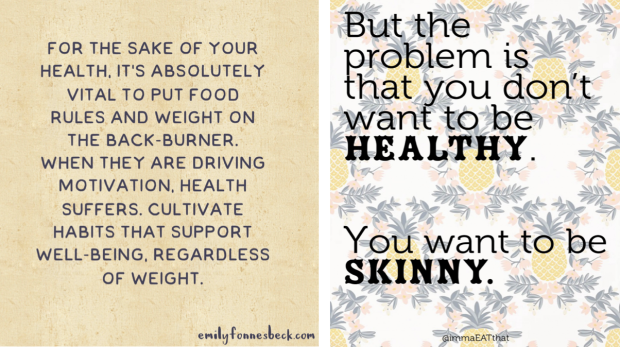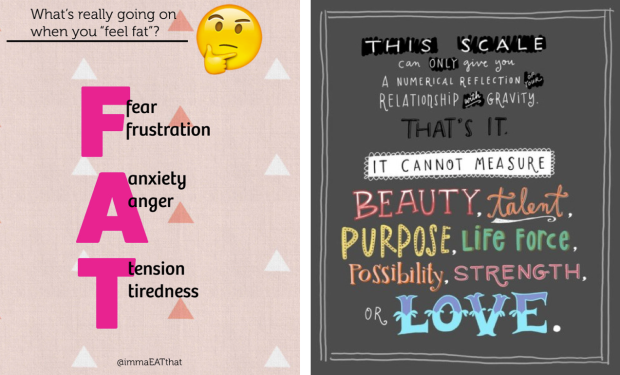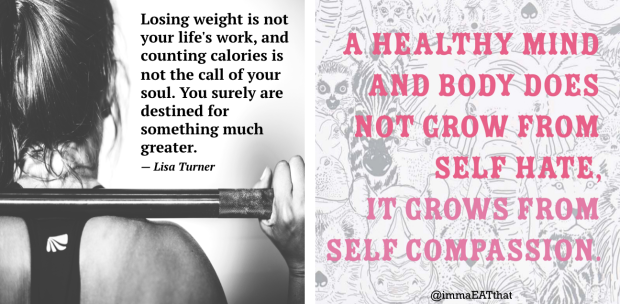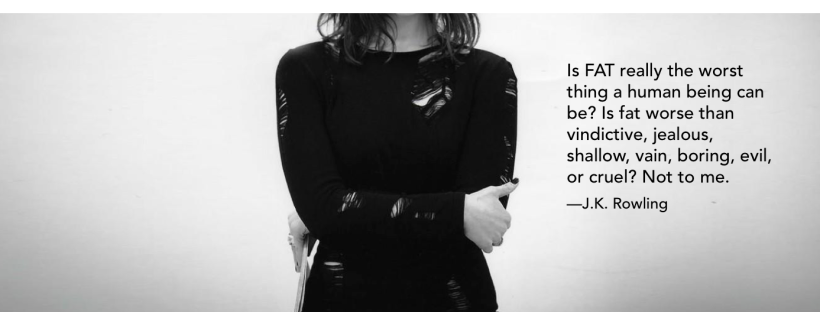It’s the voice inside your head telling you you’re not thin enough, or fit enough.
It’s the compulsive need to exercise or purge to deal with the guilt and shame of going over your “calorie budget” or eating a food you considered “off limits.”
It’s the out-of-control, impulsive urge to eat to the point of uncomfortable fullness, followed by feelings of disgust, self hate, and regret.
20 million women and 10 million men suffer from clinically significant eating disorders in the U.S., according to the National Eating Disorder Association. Yet these numbers do not even account for those silently struggling with disordered eating who have never received a formal diagnosis or treatment plan.
This week, during National Eating Disorder Awareness Week, it’s time to talk about it.
As someone with a personal history of disordered eating, with friends who have struggled with anorexia nervosa and bulimia, and with experience working with individuals with all types of eating disorders, I know all too well how serious, damaging (mentally and physically), and all-consuming eating disorders can be. I also know that there are A LOT of misconceptions about eating disorders that I hear even from the most well-educated and well-intentioned people. Let’s address those misconceptions first.

WHAT YOU NEED TO KNOW ABOUT EATING DISORDERS
Not all eating disorders are created equal.
Eating disorders often get lumped together, but the DSM-5 (Diagnostic Statistical Manual of Mental Disorders) breaks down eating disorders into four categories: anorexia nervosa, bulimia nervosa, binge eating disorder, and otherwise specified feeding or eating disorder. Since the treatment of these eating disorders vary, understanding the symptoms of each type is important to better identify and support those who may be struggling with one of these eating disorders.
In addition, there are other types of disordered eating behaviors like orthorexia and diabulemia that don’t fit into any of these four categories. Disordered eating is considered an umbrella term with subclinical disordered eating (dysfunctional eating/exercise habits) on one side and clinically diagnosed eating disorders (requiring close medical and psychological attention) on the other side of the spectrum. Although the line separating disordered eating and eating disorders can be fuzzy, the severity and treatment of disordered eating is generally determined by the extent at which the disorder impacts everyday functioning, relationships, and overall health.
“Anorexia isn’t a diet, Bulimia isn’t a bad habit, EDNOS (Eating Disorder Not Otherwise Specified) is not just being a picky eater.”
Emotions, attitudes, and behaviors surrounding food and weight are taken to the extreme in eating disorders. While personality traits and psychological factors can predispose someone to develop an eating disorder, a combination of genetic and environmental factors ultimately trigger the disorder. Like a medical condition, eating disorders require intense treatment; they don’t just “go away” with time. An eating disorder is a real, complex, debilitating mental illness with long-term consequences and a lasting impact on the individual and their families. In most cases, a team of medical physicians, dietitians, psychiatrists, and therapists are essential for full recovery to be possible.
Reaching a “normal” weight does not mean that an eating disorder is treated.
First of all, eating disorders can occur at any weight—overweight, underweight, or a “normal” weight (according to body mass index standards). Second, reaching a “normal” weight is not a sign of full recovery from an eating disorder. In fact, physical recovery with weight stabilization is often necessary before psychological therapy can be effective—thinking rationally is out of the question when the brain is running on empty. Psychologically recovering from an eating disorder can take years. Although relapse is common, the sooner an eating disorder is identified and treated, the greater likelihood of recovery. This link provides more information about the typical course of treatment for different types of eating disorders.
HOW YOU CAN MAKE A DIFFERENCE
If you know someone with an eating disorder or disordered eating, it can seem like there is nothing you can do to change his or her mindset. But, wait. Stop right there. You can make a difference.
Beyond offering your support, be a role model: embrace your own healthy, positive relationship with food and exercise. Stop the body shame, the food rules, the excessive exercise, and the never-ending battle with the scale. In our weight-focused, diet-obsessed culture, speak out against these cultural norms. They are not benefiting anyone and they are most definitely not helping those struggling with disordered eating.
Below are some of my favorite blog posts that dig deep into disordered eating, weight obsession, and body image issues and share some heartfelt words of wisdom. My hope is that these posts inspire you to change the way we, as a society, think and talk about our bodies, food, health, and wellness.
Cultivating Wellness Through Experience, Not Food Rules from Emily Fonnesback
You Are More Than A Meal Plan from Alexis at Hummusapien
How to Survive in a Diet-Obsessed World from Rachael at Avocado A Day Nutrition
The Downside to Clean Eating from Emily Fonnesback

What Happens When You Weigh Yourself 15 Times in One Day from Alexandra at Delicious Knowledge
How I Overcame Binge Eating from Lee at Fit Foodie Finds
Actionable Ways to Accept, Then Love Your Body from Robyn at The Real Life RD
How to Be Okay with Gaining Weight from Kylie at Imma Eat That

Hating Yourself Doesn’t Make You Thin, Just Like Loving Yourself Doesn’t Make You Fat from Kylie at Imma Eat That
Happy Weight Versus Ideal Weight from Alexandra at Delicious Knowledge
Falling in Like with Exercise from Marci RD
Are You an Intuitive Eater? from Kylie at Imma Eat That
Your Body Isn’t a Battlefield from Robyn at The Real Life RD

Note: If you think you may be struggling with disordered eating, take a confidential online screening quiz here. Do not wait for disordered eating to escalate into a full-blown eating disorder before reaching out for help. Get the support you need here. YOU ARE WORTH IT.
